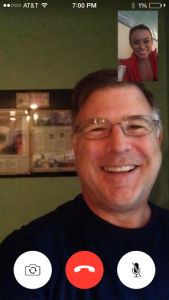Interview with Art Goetze
CEO, PEO Specialists
Facetime Conversation 10/7/14
Whitney Gibb ENT600
Background Info as taken from LinkedIn:
“I’ve been a part of some interesting business ventures that you can read about below and a couple stinkers that you can’t. I’m happy to leverage my success by helping entrepreneurs and businesses to isolate and eliminate the unnecessary drag that constrains a growth strategy and profits.
The diversity of my experience lends a unique business intuition in almost any situation. I’m a business builder, an idea catalyst, a team builder and accelerator. I work best with great people and an honest clarity of a vision/mission aligned with a sound execution model, supported by defendable market assumptions and forecasts.”
Emergency Health Centres: COO and Industry Founder: We pioneered and deployed the first non-hospital, independent ERs in the US and the first certified by the Joint Commission on Healthcare. I wrote and led passage of the first license law in the US, unleashing an explosive growth industry known as Freestanding ERs. Investment capital, organic growth, successful exit.
GroupMAC: From $0 to $1Billion in year one. Loads of M&A & integrations took us from 4 guys in a kitchen to a NY Stock Exchange IPO, 36,000 employees and $4 Billion in revenues from over 200 acquired operating companies, in under 4 years. Corporate development and rapid growth.
Texas Rock Gym: The largest real-rock climbing center in Texas was built upon a altruistic vision of connecting more youths with a lifetime of fitness and a love of the outdoors, inspired by climbing. Over 175,000 safely served, an ever growing community of fitness, and a legacy of changed lives.
PEOspecialists: Experts in-outsourcing. We know how to grow profits, instantly. Our competitive process insures our clients get the best-rates, from the right providers. Low hanging fruit always tastes best, and HR outsourcing delivers easy sustainable profit and operating improvements for any business.
Interview
Q. How do you decide how to split equity in a startup?
A. Equity you can never get back. Early in a startup it is very difficult. You can restrict it in all sorts of ways but you really need to be creative in how to split it up. You never know personalities in the beginning. I put it in at the will of the founder. I base it on milestones, time, etc. Hold back as long as you can on equity. The more you slice the thinner your stake gets.
Q. Have you ever had to go without a salary during your first phases of a startup?
A. Always! If you believe in your idea, you are trading that salary for your equity position. If you take a salary out, it sends a horrible message to the people that you are trying to raise money from. If you make it past A-round money, they don’t want you taking a salary. I will look for other things that I can do to make money on the side if I absolutely need to feed my family. We all like to think that our businesses are going to create a lifestyle, but that is not always the case. I look at my rock climbing gym as my lifestyle business, or a business that pays the bills but will never make a lot of money for me.
Q. How do you determine executive positions?
A. A CEO title implies that you have someone to manage. When you bring on employees, it is kind of like equity. People get really emotionally invested in what their title is. To me, that is a little scary and an indicator of immaturity. When you are thinking about building a company that will require an outside investment, of any kind, then they will start asking questions about who is who in your company. Who is going to manage my money? They want to know who is controlling the dollars and cents, because that is who they need to trust. When you are moving to outside financing, even angels, someone’s background is really important.
Q. How do you decide when the CEO will step down?
A. When the money says so. Everything is circumstantial. The decision becomes what is in the best interest of the business? When it is in the best interest of the business, that’s when they should step down. It is a problem when a CEO thinks they are God’s gift to Earth, because most people are then thinking, no..you are holding us back. You got us to this point but you’re not ready for what’s to come. There is a book called No Man’s Land…by Doug Tatum. Read it.
Q. Have you found that homogenous or heterogeneous teams work best in your ventures?
A. Wow. It is impossible to achieve either. By default, we all end up with these hodge podges of people. I personally prefer a team diversified in their skill sets. I’ve never been a part of a deal in which geographical or racial background matters. None of that matters to me. I’m always looking for skillset and people that have worked on similar deals to mine. Projecting in the future what I will need and looking at these people for those particular skillsets. There are a lot of people that think they are overqualified for the salary that a startup will offer them. A good CEO has to weed through the bullshit and manage a team of strong individuals with some degree of discernment.
Q. Have you borrowed from outside investors always or have you had to go to your inner circle as well?
A. I’ve had to use my own money for all of my startups. I also go to outside investors. “Implementation is the Achilles heel of every idea.” The way I choose to go with an idea may be completely different than how you would go forward with an idea. Lean Startup model should help an entrepreneur to not make bad investments. If you test the wrong pieces of your business model, you may still have big, ugly impediments that aren’t being tested and could be the fatal flaw in your deal.
Q. What do you do if a venture doesn’t work and you have borrowed money from your inner circle?
A. You lose friends. I have borrowed from my inner circle before. You have to make sure you have the man up conversation about going to do anything you can to make the business a success, but that you can’t guarantee the future. The money is at risk and you need to make that clear. It’s a ‘trust me’ thing and unfortunately you cannot predict failure. The odds are whatever you start is going to fail and people that invest their money in startups should know that. I‘ve lost friends over deals. We took in some money and it didn’t work.
Other Advise from Art:
- Read The Lean Startup, The Lean Canvas
- Every assumption you make will be wrong, but the market will tell you how to fix it.
- Keep up with your LinkedIn



